STANLEY KUBRICK'S
THE KILLING
A SHOT-BY-SHOT ANALYSIS
PART ONE

Go to TOC for this film ( (which has also a statement on purpose and manner of analysis and a disclaimer as to caveat emptor and my knowing anything authoritatively, which I do not, but I do try to not know earnestly, with some discretion, and considerable thought).
Sterling Hayden - Johnny Clay
Coleen Gray - Fay
Vince Edwards - Val Cannon
Jay C. Flippen - Marvin Unger
Ted de Corsia - Randy Kennan
Marie Windsor - Sherry Peatty
Elisha Cook Jr. - George Peatty
Joe Sawyer - Mike O'Reilly
James Edwards - Track Parking Attendant
Timothy Carey - Nikki Arcane
Kola Kwariani - Maurice Oboukhoff
Stanley Kubrick - Screenplay
Jim Thompson - Dialogue
Gerald Fried - Music
Lucien Ballard - Director of photography
Betty Steinberg - Film Editing
Ruth Sobotka - Art Direction
USA release date 19 May 1956 in New York, and 6 June 1956 elsewhere in the US.
For complete listing see IMDB.
This work followed the year after Killer's Kiss, released when Kubrick was still twenty-seven.
TOC and Supplemental Posts | Part 1 | Part 2 | Part 3 | Part 4 | Films Home
LINKS TO SECTIONS OF THE ANALYSIS ON THIS PAGE:
Preliminary - Timeline
Credits and Intro at the Race Track, Shots 1 through 10
Notes on Credits and Intro at the Race Track. These shots are of the critical race. Bay Meadows and Lansdowne. Perhaps I should relate a brief summary of the story of Pagliacci before going further. The play within the play and the breaking of the fourth wall.
Introducing Marvin Unger, the Bartender, and the Cashier, Saturday 3:45 P.M., Shots 11 through 28
Introducing Marvin Unger: Things to note.. Marvin Unger. The crowd. The sweeper anticipating the film's end. The window. The Shining. Marvin's ticket.
The Patrolman, Randy Keenan, Saturday 2:45 PM, Shots 29 through 44
Introducing Randy Keenan: Things to Note. Order of introduction of the characters. The character of Randy. The Shining and Eyes Wide Shut.
Johnny Clay and Fay, Saturday 7:00 PM, Shots 45 through 49
Introducing Johnny and Fay: Things to Note. Fay. The bars. Photographing beyond the walls, and Pagliacci.
Mike O'Reilly, The Bartender, and Ruthie, Saturday 6:30 PM, Shots 50 through 53
Introducing Mike and Ruthie: Things to Note. Mike and Ruthie. Mike's view of the note.
George Peatty, the Cashier, and Sherry, Saturday 7:15 PM, Shots 54 through 59
Introducing George and Sherry: Things to Note. Sherry and George. Papa and mama--and the climax to this exciting story? The hole in the head. Set decoration for George and Sherry's apartment.
Sherry's Lover, Val, Shots 60 through 62
Introducing Val: Things to note. Sherry goes running to Val.
Eavesdropper, Saturday 8:00 PM, Shots 63 through 95
Eavesdropper: Things to Note. The scene. Primary difference between the novel and the movie. Pagliaccio, the clown. A fondness for ship's wheel wall lamps and corner curio shelves.
Always and Always, Shots 96 through 97
Always and Always: Things to Note.
What Happens if We Remove the Narration for this Day?
This is a film with a jumbled timeline. Here's a rough rundown.
Saturday 3:45 pm Racetrack
Saturday 2:45 pm Randy Kennan
Saturday 7:00 pm Johnny and Fay
Saturday 6:30 pm Mike and Ruthie
Saturday 7:15 pm George and Sherry
Saturday sometime between 7:15 and 8:00 pm Sherry and Val
Saturday 8:00 pm the meeting (narration doesn't provide time, we know the time from earlier scenes)
Saturday night late, Sherry and George
Tuesday 10:15 am the chess club
Tuesday (assumed) Johnny and Nikki
Tuesday (assumed) Johnny and Joe Piano
Saturday 7:30 am George and Sherry
Saturday 5:00 am Breakfast with Red Lightning
Saturday 7:00 am Johnny and Marvin (both narration and Johnny give it as 7 am)
Saturday 7:00 am "It was exactly 7 am when he got to the airport" (Johnny is given as at the airport at 7 when in the prior scene he was with Marvin at 7)
Saturday 8:15 am Johnny and Joe Piano
Saturday 8:45 am Johnny at the bus station
Saturday 9:20 am Johnny drops off key at Mike's
Saturday 11:15 am Mike and Ruthie
Saturday 11:29 am Mike at bus station
Saturday 12:10 pm Mike arriving at track
Saturday, the first race, Marvin shows up at track, we are shown him at the bar as the first race ends
Saturday 3:32 pm Randy's dead radio
Saturday 4:20 (not narrated) Randy is shown arriving at the track at the beginning of the 7th race.
Saturday 2:30 pm Maurice at chess club
Saturday about 4:00 pm Maurice at track in time for 7th race
Saturday 11:40 am Nikki at farm
Saturday 12:30 pm Nikki at the track
Saturday 4:24 pm Nikki is dead
Saturday 2:15 pm Johnny purchases briefcase
Saturday 4:20 pm The 7th race
Saturday 7:15 pm Marvin's place
Saturday 6:25 pm "40 minutes before, at 6:25...(Johnny) was 15 minutes behind schedule" at the motel. 6:25 would be actually 50 minutes before 7:15.
Saturday 6:30 pm 6:30 is the time at which Johnny told Joe Piano the cop would be by to drop off the package and he was to let him in the cabin. Johnny arrives at the hotel at 6:25 and is given as already being 15 minutes being schedule, so he should have been there at 6:10, 20 minutes before Randy's drop off.
Saturday 6:30 pm The time that Maurice is supposed to be at the Chess club. If he's not back yet, Fisher is to call the lawyer to bail him out.
Saturday 7:29 pm Johnny outside Marvin's. He is given as being 15 minutes late, though he was supposed to arrive at 7:00 pm. He is instead 29 minutes late. He was problematically at the cabin at 6:25 so it has taken him a little over an hour to get to Marvin's. However, Maurice, who supposedly dropped off the loot at 6:30, was at Marvin's within 30 minutes.
Saturday 7:39 pm Johnny gets luggage at pawn shop
Saturday between 7:39 and 9:00 pm, Johnny at the RR crossing
Saturday after 7:39, George and Sherry
Saturday about 9:00 pm, Johnny and Fay at the airport
1 LS Race horses being led out of holding stalls, beginning with horse. Timpani, then hard-boiled crime music. (00:24)
HARRIS-KUBRICK presents
2 Horses led out toward the track. (00:31)
THE KILLING
Starring STERLING HAYDEN
Co-Starring COLEEN GRAY, VINCE EDWARDS
3 Horses proceeding down the track. (00:49)
Featuring JAY C. FLIPPEN, TED CeCORSIA, MARIE WINDSOR, ELISHA COOOK, JOE SAWYER, JAMES EDWARDS
With KOLA KWARIANI, JAY ADLER, TITO VUOLO, DOROTHY ADAMS, HERBERT ELLIS, JAMES GRIFFITH, CECIL ELLIOTT, JOSEPH TURKEL, STEVE MICHELL, MARY CARROLL, WILLIAM BENEDICT, CHARLES R. CANE, ROBERT B. WILLIAMS
Associate Producer ALEXANDER SINGER, Camera Operator DICK TOWER, Gaffer BOBBY JONES, Head Grip CARL GIBSON, Script Supervisor MARY GIGSONE, Sound EARL SNYDER, Best Boy LOU CORTESE, 2nd Assistant Cameraman ROBERT HOSLER, Construction Supervisor BUD PINE, Chief Carpenter CHRISTOPHER EBSEN, Chief Painter ROBERT L. STEPHEN, Make-up ROBERT LITTLEFIELD, Wardrobe JACK MASTERS, Special Effects DAVE KOEHLER, Set Decorator HARRY REIF, Assistant Set Decorator CARL BRAINARD
Music Editor GILBERT MARCHANT, Sound Effects Editor REX LIPTON, M.P.S.E., Assistant Director MILTON CARTER, 2nd Assistant Directors PAUL FEINER, HOWARD JOSLIN, Production Assistant MARGUERITE OLSON, Prop man RAY ZAMBEL, Transportation DAVE LESSER, Women's Wardrobe RUDY HARRINGTON, Hairdresser LILLIAN SHORE, Process Cameraman PAUL EAGLER, Director's Assistant JOYCE HARTMAN, Miss Windsor's Costumes by BEAUMELLE, Photographic Effects JACK RABIN/LOUIS DEWITT
4 Closer shot of the horses on the track. (1:16)
The camera pans with the horses as they pass.
Director of Photography LUCIEN BALLARD A.S.C., Art Director RUTH SOBOTKA, Film Editor BETTY STEINBERG
Music Composed and Conducted by GERALD FRIED
5 Four white draft horses pull the starting gate wagon. (1:27)
Screenplay by STANLEY KUBRICK, Dialogue by JIM THOMPSON, Based on the novel "Clean Break" by LIONEL WHITE
6 Horses enter the starting gate stalls. (1:39)
7 Horses 4 and 6 enter the starting gate stalls. (1:43)
8 Horses enter the starting gate stalls. (1:49)
9 Quick crossfade to horses from the rear in their starting stalls. (1:52)
Produced by JAMES B. HARRIS
Directed by STANLEY KUBRICK
10 Horses from left front in Bay Meadows starter stalls. The bell rings and they plunge out. (2:00)
ANNOUNCER: And they're off! It's Lucky Arrow, breaking on top. Purple Shadow is 2nd...
Shot 1 | Shot 2 |
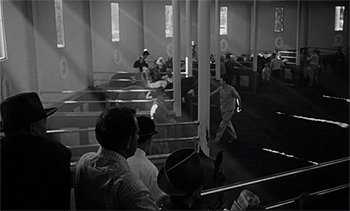 | 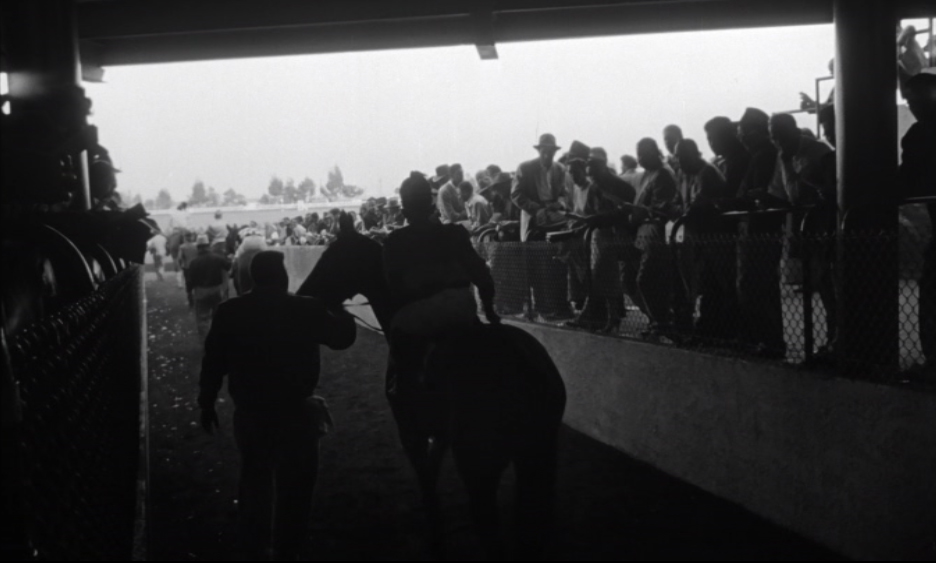 |
Shot 3 | Shot 4 |
 |  |
Shot 5 | Shot 6 |
 | 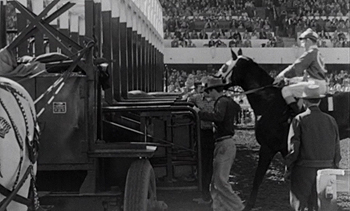 |
Shot 7 | Shot 8 |
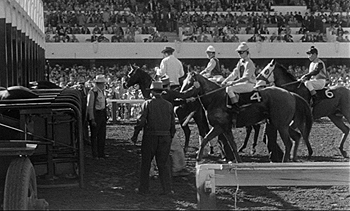 |  |
Shot 9 | Shot 10 |
 | 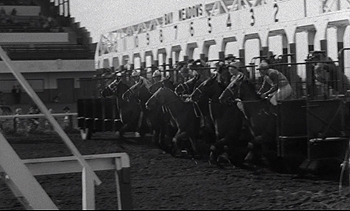 |
Though The Killing is a great stride away from Killer's Kiss toward Lolita, or such is my feeling, that it is more genetically similar to Lolita than Paths of Glory, I feel a certain restraint in The Killing that is going to make it difficult to discuss in relationship to Kubrick's later works.
The assumption of the viewer may be that the credit shots are of the race upon which Unger has placed his bets on the final Saturday in September at the opening of the film. Instead, we find later that they are shots from the critical 7th race during the later robbery at track, shots 2, 4, 5 and 7 being recycled later.
Creating a cycle connecting the end of the film to the beginning, Fear and Desire opened with a shot of the mountains in which the action was to presumably take place and ended with the same shot of the mountains. Killer's Kiss did the same but through the action taking place in a flashback. It opens with Penn Station, moves into a flashback, and ends with moving forward in time to action in Penn Station. The Lolita credits are presumably a scene of Humbert painting Lolita's toenails, which has a great resemblance to a later scene in the film in which Humbert paints her toenails six months after their arrival at Beardsley, but are actually different scenes. After the credits we have Humbert driving to Quilty's mansion for their confrontation, after which we flashback to the story of Lolita, and then the film ends on that seeming same scene of Humbert entering Quilty's mansion as had in shot 4, though it is instead a different take. Cycles. All these films cycle round but with alterations either significant or slight, such as the ending of Lolita appearing to be the same shot of Humbert entering the mansion but is not.
The Killing opens with the horses being taken from holding stalls, the light that comes through the windows in slashes communicating more like cathedral windows spilling radiance, then cuts to the horses being taken out onto the track. Because of repeat action in the film, some of these shots occur several times. Shot 2 is the same as shot 201 and 254 and 283. Shot 4 is from the same footage as shot 203 and 256. Shot 5 is the same as shot 206 and 258 and 286. Shot 7 is the same as shot 207 and 259. These credit shots end with the horses bolting out of the gate under the voice-over that Lucky Arrow and Purple Shadow are included in the line-up, so we are indeed intended to view this as the race that is occurring as Marvin Unger strides to the bar, and yet Kubrick repeats use of these shots during the later critical race in creating another one of his cycles.
We see that this is the Bay Meadows track that was in San Mateo (it no longer exists), but in the movie its name is Lansdowne. The Lansdowne track was one in British Columbia, which I think is significant, that the track is given this particular name. This will be discussed as we look at the references to clowns in the film, and consider the love-stricken fool Pierrot (Pagliaccio), and his jealousy over his wife/lover Columbine. Pierrot is pointedly referred to a couple of times in the film, and the clown mask used by Johnny is peculiar to the film, it was not in the book. We have the race track itself associated with the name of the "dove" Columbine (Columbia). Appropriately, the track is a faithless obsession who drives her foolish lovers mad. I know this will strike the vast majority as preposterous, but minds may be changed along the way.
George Peatty is, at one point, identified as Pagliacci. The viewer should be familiar with the opera or they will miss out on references to it.
The main characters of Pagliacci are almost all actors in a theatrical troupe:
Tonio plays the clown, Taddeo, who is Columbine's servant.
Canio, the head of the troupe, plays Pagliaccio (Pierrot).
Nedda, Canio's wife, plays Columbine, Pagliaccio's wife.
Beppa, another member of the troupe, is Harlequin. In the play, he is Columbine's lover.
Silvio, a peasant, is Nedda's real lover.
At the beginning of the opera, Tonio steps before the curtain and announces that the story the audience is about to witness is real, that actors/clowns feel the same pains and joys as real people.
In Act I, villagers tease Canio that Nedda is having an affair with Tonio, Tonio having been observed to be perhaps a little too familiar with Nedda. Canio says he may be a foolish husband, as is his stage character/alter ego, Pagliaccio, but he would never tolerate such a betrayal in real life. When Beppa and Canio go to a tavern to drink, Nedda watches birds in the sky, envious of their freedom. Tonio, who has remained behind, attempts to force himself on her and she fights him off with Beppe's whip, striking him on the face. After this, Tonio overhears Nedda and Silvio together and that they are planning to run away together that night. However, he doesn't see who Nedda's lover is. Jealous, he tells Canio, who returns in time only to hear Nedda calling to her lover, "I will always be yours", but doesn't see him. He threatens Nedda with a knife when she refuses to divulge to him the name of her lover. Beppe restrains Canio who prepares to put on the costume of the clown though his heart is breaking.
Act II is the performance. Silvio is in attendance in the audience that night. During the play, Harlequin serenades Columbine from outside her window. Taddeo, returning from market, tells Columbine he loves her but she scoffs at him. She lets Harlequin in through the window, who kicks the buffoonish Taddeo out. Harlequin gives Columbine a drug with which she is to put Pagliaccio to sleep so they may escape together. Pagliaccio appears and Harlequin slips away, Columbine calling out, "I will always be yours". Columbine's calling out the same words as she had in real life causes Canio to slip out of his role (unbeknownst to the audience), he demanding of Columbine/Nedda who her lover is. Finally, he stabs her. When Silvio rushes forward to aid her, Canio realizes this is her lover and stabs him as well.
"The comedy is finished," is often spoken by Pagliaccio but was originally voiced by Tonio.
Pagliacci is the plural of pagliaccio. The play is called pagliacci in other to be inclusive of both Canio and Tonio as clowns.
The play within a play scenario suggests the breaking of the fourth wall into reality. Kubrick had already worked with this in Killer's Kiss as I've described in my analysis of it in notes on the death of the boxer's manager in an alley outside a theater. Thugs pursuing him, the manager hears an audience laughing in a theater and struggles to get their attention, to escape into that audience, but they don't hear him, he doesn't escape. That audience represents the cinema audience. Kubrick also works with this in his referring, in Killer's Kiss, to the magic show, Himberama, in which Orson Welles, on a film screen, breaks the fourth wall and dialogues with the audience both directly and through the intermediary of a magician who exits the stage into the audience and brings an audience member back onto the stage. A part of this show is duplicated almost exactly in Killer's Kiss.
Kubrick's most obvious breaking of the fourth wall was with A Clockwork Orange, which I describe in depth in that analysis.
Pagliaccio is never mentioned in the book upon which The Killing is based, nor does Johnny wear a clown mask during the robbery. But the character of George, a jealous cuckold of a husband who comes to fear his wife is having an affair with Johnny, is a natural for Pagliaccio, and Kubrick thus transforms him into Pierrot, his wife into Columbine, and uses this to impress on The Killing the play within the play. Or maybe it was an idea of Jim Thompson, credited with writing dialogue? I don't know and it doesn't matter, really, who originated the idea of pulling in Pagliaccio. What matters is Kubrick used it to his directorial advantage.
11 LS of scene inside the track. (2:07)
The camera closes in on and follows to the side of an older man in a bow tie and hat. He walks past the Cashier booths and a man sweeping the floor.
NARRATOR: At exactly 3:45 on that Saturday afternoon in the last week of September, Marvin Unger was perhaps the only one among the 100,000 people at the track, who felt no thrill at the running of the 5th race. He was totally disinterested in horse racing and held a lifelong contempt for gambling. Never-the-less, he had a $5 win bet on every horse in the 5th race. He knew, of course, that this rather unique system of betting would more than likely result in a loss, but he didn't care. For, after all, he thought, what the loss of $20 to $30 meant...
12 Shot of bar from the side. (2:37)
A bartender wipes glasses. A man and woman are at the opposite end of the bar.
NARRATOR: ...in comparison to the vast sum of money ultimately at stake.
MARVIN: Bottle of ginger ale, please.
BARTENDER: Yes, sir, coming right up. (Pouring as Unger tosses a quarter on the bar.) Favorite broke bad. Could be anybody's race.
ANNOUNCER: Lucky Arrow by a head. Purple Shadow between horses.
MARVIN: Could be.
BARTENDER (confidentially, wiping the counter): Put a $5 win next to the $5 place.
ANNOUNCER: Stopwatch is third by three quarters.
13 CU of Unger lifting his elbow off a message that he had placed under his elbow propped on the bar. (2:57)
ANNOUNCER: Southern Star is next.
The message reads: 504 W Olive, Apt 4B 8 pm. The bartender takes it.
The fine print is 5 MR. JIGGS 116, 6 SPANISH SHERRY 107, 7 SPECIAL CAPT. 116, 8 FUDDY'S BABY 100.
14 MS Unger drinking, the bartender swiping the message off the bar. (2:59)
ANNOUNCER: Main Entrance and Stanley Cage.
UNGER (places his glass on the bar): Quite a crowd you got.
BARTENDER: Yeah.
Unger crosses back across the room.
ANNOUNCER: Passing the quarter pole, it is Lucky Arrow and Shadow with Stopwatch on the outside to third.
Unger stops and listens.
15 Horse 11 on the track. (3:11)
ANNOUNCER: At the head of the stretch, it is Purple Shadow leading by a length. Lucky Arrow (3) is second by three quarters. Stopwatch, going up on the outside, is third by a length and a quarter. Then comes Southern Star, Main Entrance, Stanley K [Cage in subtitles], Third Row and Lover's Dilemma. It is Lucky Arrow between horses by a head, Purple Shadow by a head and Stopwatch moving fast on the outside. It's Lucky Arrow, Purple Shadow and Stopwatch neck and neck. It's Lucky Arrow, Purple Shadow and Stopwatch. It's Stopwatch taking the lead. Stopwatch by a head.
16 Return to MS of Unger listening. (3:45)
ANNOUNCER: Purple Shadow second by a head. Lucky Arrow third by a length.
17 CU of tickets Unger has pulled out of his pocket. He shuffles through them. (3:48)
ANNOUNCER: And Southern Star finished fourth.
The top ticket reads Lansdowne Park, 5 Dollar, REzP..., No. 1, sixth race. then No. 2 ticket, No. 3, No. 4, No. 5, No. 6, No. 7 and No. 8. He flips over No. 8 and looks at its blank back.
18 MS Unger. (3:54)
He takes out a pen and writes on the back of the ticket.
19 CU Unger writing on the ticket. (3:59)
504 W Olive
App 4B
8 pm
20 MS Unger discards the rest of the tickets on the floor. (4:06)
He turns and walks to the rear to the cashier booths while people come flooding in from the track.
NARRATOR: Waiting for the race to become official, he began to feel as if he had as much effect on the final outcome of the operation as a single piece of a jumbo jigsaw puzzle has to its predetermined final design.
22 MCU Unger at the cashier window. (4:24)
NARRATOR: Only the addition of the missing fragments of the puzzle would reveal whether the picture...
23 MCU cashier. (4:28)
NARRATOR: ...was as he guessed it would be.
ANNOUNCER: The result of the fifth race is now...
23 MCU Unger. (4:35)
ANNOUNCER: ...declared official.
24 CU the ticket placed on the counter. (4:35)
We've a brief glance at the back of the ticket, its writing slightly different from that in shot 19.
25 MCU the cashier. (4:37)
26 CU the ticket placed on the counter. (4:39)
The cashier turns the ticket toward him and slides it to the side. He writes something on another slip of paper.
27 MCU Unger watching. (4:46)
28 MCU Cashier. (4:51)
CASHIER: Twenty-five dollars.
Unger walks off screen left.
Shot 11 | Shot 12 |
 |  |
Shot 13 | Shot 14 |
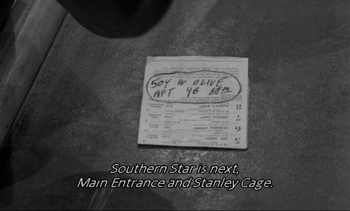 |  |
Shot 15 | Shot 16 |
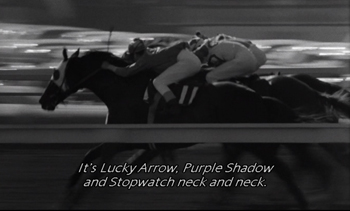 | 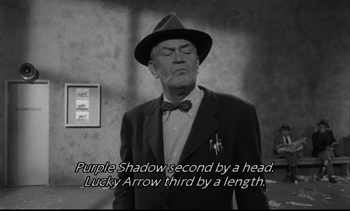 |
Shot 17 | Shot 18 |
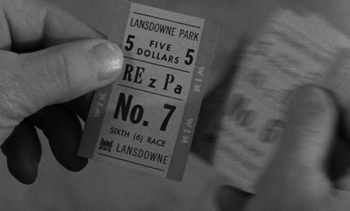 |  |
Shot 19 | Shot 20 |
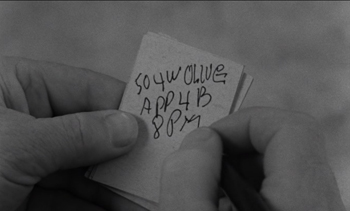 |  |
Shot 21 | Shot 22 |
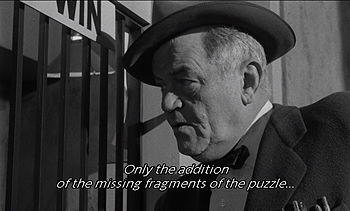 | 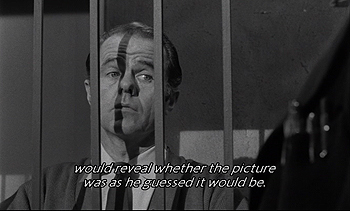 |
Shot 23 | Shot 24 |
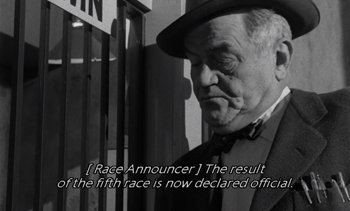 |  |
Shot 25 | Shot 26 |
 |  |
Shot 27 | Shot 28 |
 |  |
It's fascinating what's different between the movie and the book and what's not.
There are differences between some of the characters in the movie and those in the book, while others are largely unchanged. One of the characters most notably different from the novel is that of Marvin. In the novel he is a court stenographer in his 30s who accepts Johnny as the brains of the heist but is also perpetually annoyed by him. They haven't much history between them, as compared to some of the others. Marvin's critical input is, as in the film, being the one who fronts the money to finance the heist, and Johnny stays at his place until he can no longer tolerate him.
In the film, Marvin, a bookkeeper, is represented as a father figure for Johnny, and they obviously have some kind of history which is never discussed for Marvin is devoted to him and vows he would do anything for Johnny. But Marvin is, as we come to see, more than a father figure. He later is revealed to be likely involved with Johnny romantically, or hopes for such an involvement. A highly empathetic figure, he's crafted as one of the solider characters in which one has an implicit trust and a confidence that he would indeed sacrifice everything for Johnny. This is not the case in the book.
The book opens with this scene, Marvin having made $10 bets on each horse, rather than the $5 in the film.
In this scene, as Marvin approaches the bar, the camera's eye upon him is continually interrupted by people who stand so close to the camera, in dim light, that they are little more than shadows.


After his stop at the bar, as he crosses left again, the camera has moved in beyond these people so they no longer obstruct our view.

The distancing by way of these obstructions is an interesting effect and one that is carried over into other scenes. These intermediary characters remove us from the action but yet make it more intimate, as if we are also part of the faceless crowd, standing amongst or beyond them. I have wondered if it isn't part of the Pagliacci effect, building an audience into the film itself, as with Pagliacci. I will return to discussion of this idea during the heist.
The expanisve clubhouse set, Marvin making his long walk across it to the bar then back to the cashier cages, the individual sweeping up the numerous abandoned tickets, harkens back to the opening scene in Killer's Kiss in which Davey paces in Penn Station while a man carrying a double bass makes his way to the far end of the station and back, a sweeper stepping out at one point and exiting the screen at about the same time as the man with the double bass, then the shot finishing with a man in a hat, his face masked by shadow, crossing the scene and stopping to look toward Davey and the camera. There is indeed something unsettling in that gaze of the shadowed, faceless man toward Davey and the camera, as if The Killing managed to step through a wormhole and visit the set of Killer's Kiss. The figure reminds of Johnny, especially in shots 290 through 293.
The sweeper and the floor filled with the abandoned tickets also anticipates the end of the film and the litter of cash swept about the airport tarmac by the wind of the plane's propellors.
What most stands out with the set is the use of light, this great magnified off-kilter cross of a window and four large panels of light filling the wall behind Unger next the NO ADMITTANCE door upon which much of the action will later be focused. The oversize window has the effect of belittling the players on this large stage. If we compare this window to others in Kubrick's films, it reminds most of the peculiar 2nd floor window in Lolita's Haze household, a window that shouldn't be there architecturally, like the office window in The Shining shouldn't be there. Architecturally, the household set and the hotel set in those two films is not at all how it is represented on the exterior, and Kubrick lets us in on this all along in both minor and outrageous ways, the most glaring and unavoidable "tell" being the revelation of the window which has no place being where it is. The light and shadow cast upon the wall by this window in The Killing feels much the same, has much the same weight. It can be easily ignored by the audience, but is as present as a significant character, inescapable, and somehow wrong, moving the set from simple realism into the mythic, a construct of the mind.
By way of the windows in this film we often have some very dramatic use of shadow and light in unexpected ways. At times the feel is strongly Citizen Kane or German expressionism, but the drama of harsh black/white chiaroscuro with no grays is rarely used. The lighting in Killer's Kiss was not always clumsy, there was some good naturalism, but when it was wrong one saw inexperience rather than inattention or intention, as with the framing of some of the shots, and certainly with the acting. Not so in The Killing. Much has been learned. Yet, despite interesting blocking and use of light/shadow, there is still, in my opinion, a blandness to the screen and the middle field of tonal qualities, and at times a somewhat stilted quality is had. I must say that on first and second viewings of the film I didn't find the lighting, the cinematography, the acting to be interesting. I didn't care for it, and I have enjoyed a fair amount of film noire. It didn't feel Kubrick to me yet. He was still exploring how to use the camera, lights, sets. Eventually I began to find Kubrick in how the film was shot but it took several run-throughs before I saw his touch in the cinematography and its connections to later films. To reach Kubrick I also had to initially focus on how the story was crafted and its place in the development of Kubrick's directorial language. Now? Well, now I quite enjoy what he did in The Killing and am appreciative of the craft exhibited. Much is different from his later films but it's decidedly Kubrick and fascinating to examine.
In some respects I feel a strong kinship between the tracking shot of Unger in this scene and the "opening" shot of Jack in The Shining (or a secondary opening, after the credits), where he enters the Overlook, only nothing ever intervenes between Jack and the camera. Marvin has this long walk through an open space to the counter of the bar and then goes to the ticket window. In The Shining, Jack has the walk through the open space of the lobby as he goes to the receptionist counter, then from there is redirected to the office. The action of the extras in The Killing is around and stickily before Unger. In The Shining one is pulled to the action of the extras in the lobby, they are all curiously present, but they are mostly background, and sometimes Jack feels like the sticky detracting part at the front of the scene.
We are given a close-up look of the tickets and that they are for the 6th race rather than the 5th.
Having this close-up look we note that Marvin's scrawl of the address in shot 19 is not the same as in shot 24.
The ticket pinned to the counter before George reads the fourth race 27 Oct 1955, rather than September, which would have placed the date of the heist on November 3rd. In the book, Marvin was betting on the fourth race, and the action occurred in July, the race on the last Saturday in July.
Mr. Jiggs, Fuddy's Baby, and Spanish Sherry are among horses reported, in the 28 October 1955 San Bernadino Sun as having run at Bay Meadows. I don't find anything about a Southern Star, Lucky Arrow, Stopwatch, Purple Shadow. These must be fictional, like Stanley Cage.
In the book, the story takes place in New York. Kubrick has moved the action from the east coast to LA. (This was apparently by necessity.)
Marvin's address in the movie is 504 W. Olive, Apt. 4B. In the book his address is 712 East 31st Street, Room 411. I've shown, in Killer's Kiss, how Kubrick appears to have already been using the number 114, curiously enough. It was associated twice with a knock-out punch. It may be that Kubrick saw the 411 in the novel, and though it's reversed he could have thought of it as being discreetly present in the film by means of the source material of the novel.
29 LS A policeman leaving his car numbered 59. (5:00)
NARRATOR: About an hour earlier, that same Saturday afternoon in September, in another part of the city, Patrolman First Class Randy Kennan had some personal business to attend to.
The camera, from inside, follows him through the window as he leaves his car, enters the building and goes to the bar where small band jazz music plays.
RANDY: Hiya, Tiny. What's the good word?
TINY: Same as always. Havin' a ball.
RANDY: I'll see you later.
Tiny will later be seen to be a friend of Val's, Sherry's lover.
Kennan continues over to a booth where a man waits, the camera panning to follow. He sits.
LEO: Good evening, Randy. How have things been?
30 MS Kennan. (5:25)
RANDY: What's the use of kickin', Leo? You wouldn't believe it anyway.
LEO: Oh...
31 MS Leo from beyond Kennan's left. (5:29)
LEO: ...I suppose they've been very well. After all, a man drives a new car, lives in a fine...
32 MS Kennan. (5:34)
LEO: ...apartment.
RANDY: So, I like to live good. You got any...
33 MS Leo from beyond Kennan's left. (5:29)
RANDY: ...objections?
LEO: None at all. As long as you don't overlook your obligation to me. I trust it was purely an oversight. I'm sure a man in your position wouldn't deliberately...
34 MS Kennan. (5:48)
LEO: ...antagonize his creditors.
RANDY: I ain't got it, Leo. I know I should have it, and I'm as anxious to pay off as you are to have me, but I just ain't got it.
35 MS Leo from beyond Kennan's left. (5:56)
LEO: Well, we all get a little cramped now and then. Suppose we make it a thousand? I'll rewrite the balance as a new loan. Give you a fiscal breather. Fresh start.
36 MS Kennan. (6:06)
RANDY: Listen, Leo. I'm broke. Get me? Flat broke. Right now, I couldn't give you a thousand cents. But, if you can wait a couple of weeks...
LEO: Might be arranged.
37 MS Leo from beyond Kennan's left. (6:15)
LEO: With the proper collateral, of course.
38 MS Kennan. (6:17)
RANDY: You mean, where is the dough coming from? I can't tell you, Leo. All I can tell you is it's a plenty sweet deal and I'll be able to pay off like a slot machine.
39 MS Leo from beyond Kennan's left. (6:25)
LEO: In two weeks you said? No longer?
RANDY: Maybe even less than that.
49 MS Kennan. (6:26)
RANDY: You know I wouldn't pull a thing like this on you. I couldn't afford to.
41 MS Leo from beyond Kennan's left. (6:33)
LEO: I'm glad you said that, Randy. I was going to point out as much myself, but since you relieve me of the unpleasant necessity...
RANDY: It's a deal, then?
42 MS Kennan. (6:41)
RANDY: I pay you the $2600 within the next two weeks.
LEO: Plus $400, a total of $3000. The extra interest, of course. I trust that'll be satisfactory.
RANDY: I can't say no.
43 Return to the end of the opening shot, where Kennan sat down at the booth, a MS on Leo. (6:52)
LEO: Thank you, Randy. (They shake hands.) I was sure you'd see it my way.
Kennan rises.
44 Kennan rising. (6:56)
Then he sits back down.
LEO: Take good care of yourself.
RANDY: I'll take care of myself, mister. That's my speciality.
Kennan now rises and leaves.
Shot 29 | Shot 30 |
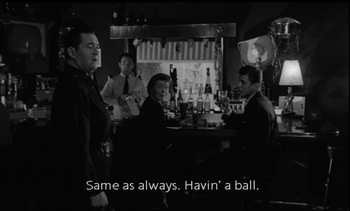 | 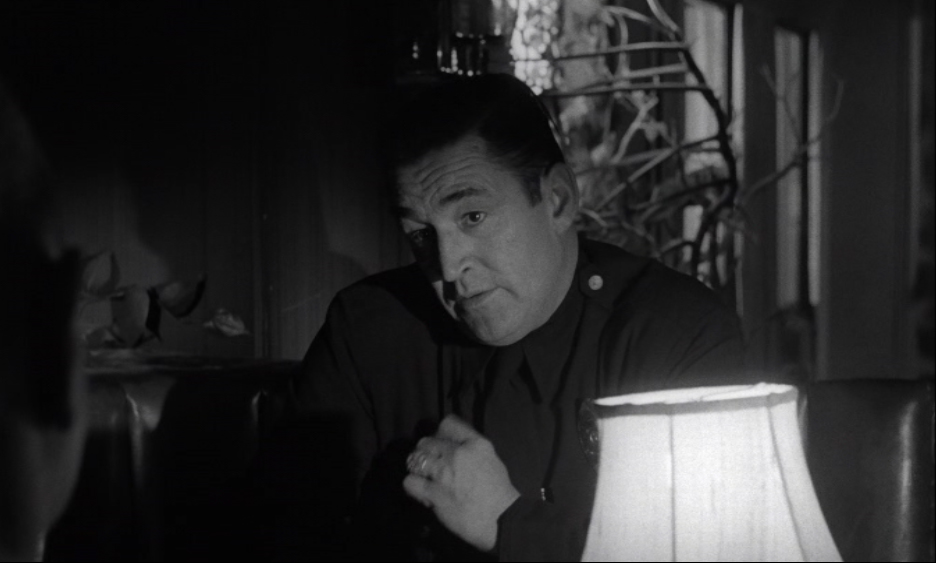 |
Shot 31 | Shot 32 |
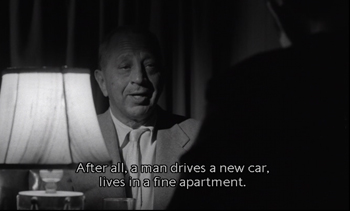 | 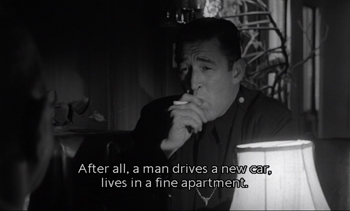 |
Shot 33 | Shot 34 |
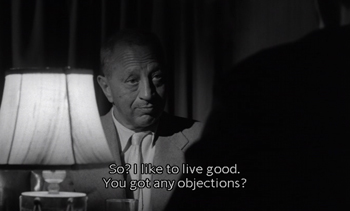 | 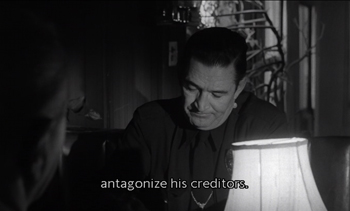 |
Shot 35 | Shot 36 |
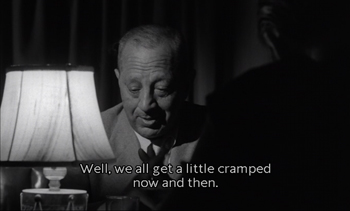 |  |
Shot 37 | Shot 38 |
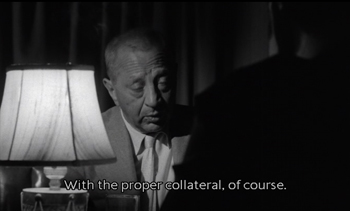 |  |
Shot 39 | Shot 40 |
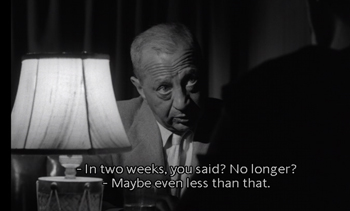 | 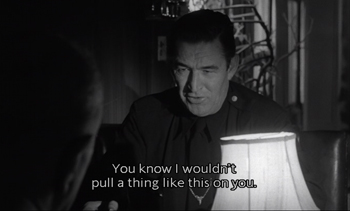 |
Shot 41 | Shot 42 |
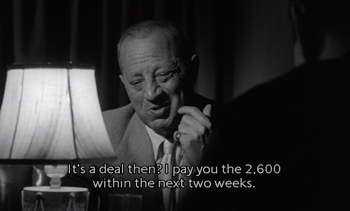 | 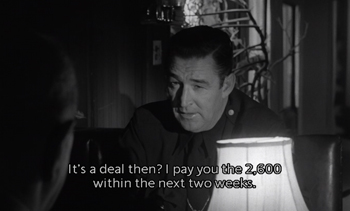 |
Shot 43 | Shot 44 |
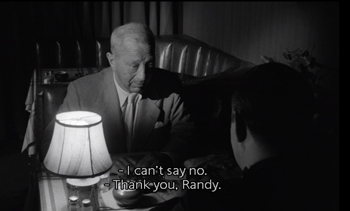 |  |
After the opening with Marvin at the track, the film moves back in time when the book does not, it instead progressing forward in time as it introduces us to the bartender, Big Mike, then George, then Randy. And there really is no especial reason to take us back in time to meet Randy, leap forward to Johnny, then step back in time again to introduce Mike's home situation with Ruthie.
As Randy enters the bar he calls out to Tiny, with whom he is familiar, then says he'll see him later. Tiny turns out to be a friend of Val's, and when Randy sees him again it is not until Val and Tiny crash Marvin's apartment in order to steal the heist money. Randy misses observing Tiny outside Marvin's apartment building when Randy and Mike hustle George out following Sherry's surprise visit. The bar scene is the only time Tiny's name is mentioned and it's unlikely that many people will recognize Tiny later as Val's pal. In the book, Tiny is a large guy and doesn't appear until the scene when he and Val crash Marvin's place after the heist.
This glimpse is about as much personal context as we get for Randy in the film. We are shown everyone else's apartments (except Fay's) while instead we are here given the picture that Randy lives well, above the means of the others, but we are not taken otherwise into his private world.
More of Randy is presented in the book as he becomes involved with George's wife.
I think everyone is aware that Tiny is played by Joe Turkel, who was also in Paths of Glory and played the bartender in The Shining. In The Shining we are never confident of whether or not he is a ghostly figure, or a figment of Jack's imagination, and so it is of some interest that we have him in The Killing sitting before the bar, as a customer, stating he's having a ball, which reminds of Jack's scenes with Lloyd in the Gold ballroom.
In The Shining Jack never sits at one of the ballroom tables decorated with their individual lamps, but Bill, in Eyes Wide Shut, does sit at such a table in the Sonata when he meets with the piano player, and a bit of DNA from this scene may be found in that one.
45 MS Clay in his kitchen, opening a beer, seen from beyond the 4th wall, cabinet. We don't yet see his face. (7:04)
NARRATOR: At 7:00 p.m., that same day, Johnny Clay, perhaps the most important thread in the unfinished fabric...
From beyond the 4th wall, the camera follows Johnny as he speaks, his dialogue taking up the narrator's thread in exposition. He moves through three walls (the kitchen, middle room, the room in which is his lover), but it feels to be more than that as the camera tracks along with him passing behind not only the partitioning walls but bookcases and blinds and curtains. Beautifully shot.
JOHNNY: None of these men are criminals in the usual sense. They've all got jobs. They all live seemingly normal, decent lives. But they got their problems, and they've all got a little larceny in them. Now, you take my pal, Unger, for instance. The guy who owns this apartment. He's putting up the money to operate with, and he's letting me stay here.

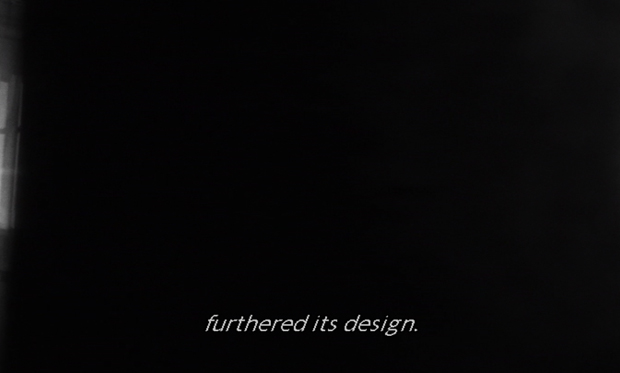



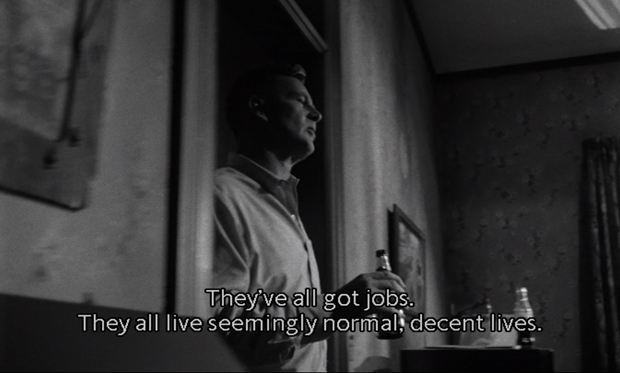
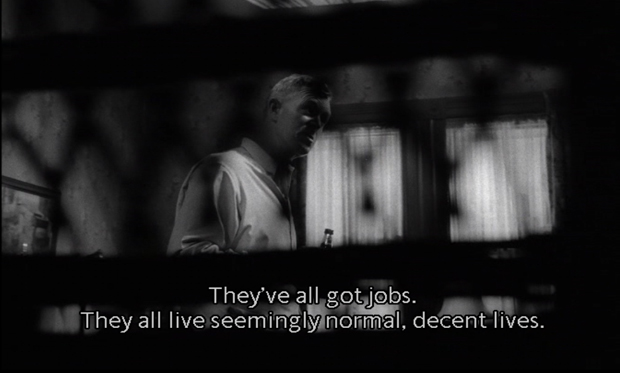

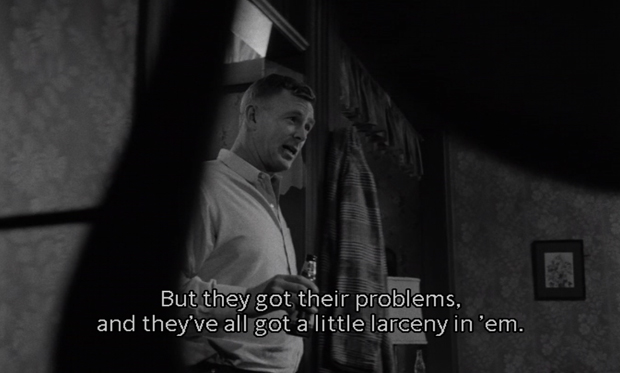
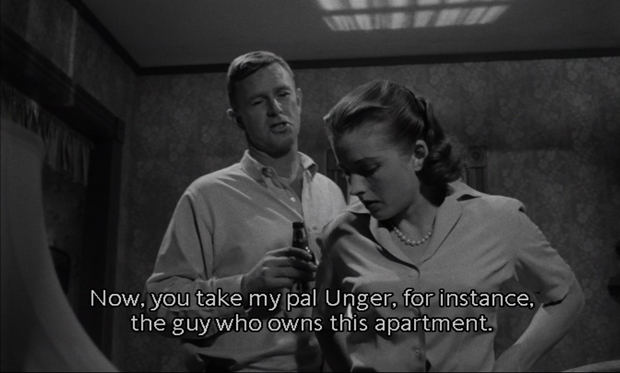
46 MS Johnny sitting and pulling his lover toward him, buckling her belt. (7:32)
JOHNNY: He's a bookkeeper. Been with the same company for 10 years. You know, Fay, the biggest mistake I made before was shooting for peanuts. Five years have taught me one thing, if nothing else, any time you take a chance you better be sure the rewards are worth the risk because they can put you away just as fast for a $10 heist as they can for a million dollar job.
She sits on his lap.
47 MCU Fay on Johnny's lap. (7:50)
FAY: You don't have to sell it to me, Johnny. You know I'll go along with anything you say. I always have, you know, ever since we were kids. I've always believed you, everything you've ever told me. Those five years you've been away, I, I know they must have been terrible for you. I mean, being locked up must be a terrible thing. You know something? This may sound funny, but, waiting for you all those years and staying by myself, it was like, not that you were locked in, but I was locked out. Well, look at me. First time we've been together in five years and I'm making speeches.
JOHNNY: No, now, everything is going to be all right, I promise you.
FAY: Make sure you're right about it, Johnny. I'm no good for anybody else. I'm not pretty and I'm not very smart. So, please, don't leave me alone anymore.
JOHNNY (standing): Aw, nothing is gonna happen.
48 MCU Johnny and Fay. (8:49)
JOHNNY: Not this time.
FAY: Well, I guess I'd better leave you be now. I know you've got a lot of work to do. When will I see you again?
JOHNNY: Saturday night. We'll be on the plane together. Look, Fay, until it's all over. I want you to stay out of the way. Yeah?
FAY: If there's anything I can do to help...
JOHNNY: No, nothing. You just make the plane reservations. And, remember, tell them at the office that you're leaving. Tell them you're getting married, huh?
FAY: I don't want to say goodbye.
They begin to kiss, which is interrupted by Unger arriving.
49 MS Johnny and Fay kissing, Unger walking in. (9:18)
MARVIN: Oh... (He turns to pehaps leave.)
JOHNNY: Hello, Marv, we were just talking about you.
MARVIN: Hi, Johnny. Hi, Miss Fay.
FAY: Hello.
MARVIN: I hope it was something nice.
FAY: Oh, yes. Johnny was telling me about what a wonderful friend you were.
JOHNNY: Fay was just leaving, weren't you, baby?
MARVIN: Oh, don't rush off on my account. I...
JOHNNY: Ah, she's late for an appointment.
FAY: That's right. You'll be sure to call me, won't you, Johnny?
JOHNNY: Yeah, yeah, I'll do just what I told you I would.
FAY: It was nice to see you again, Mr. Unger.
MARVIN: Thank you.
FAY: Take care of Johnny.
MARVIN: Oh, there's nothing I wouldn't do for Johnny.
FAY: I'll see you.
Fay exits. Crossfade to the bartender entering his apartment.
Shot 45 | Shot 46 |
 | 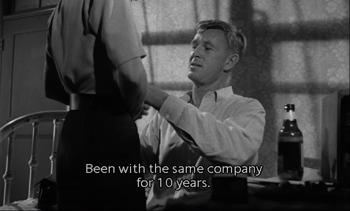 |
Shot 47 | Shot 48 |
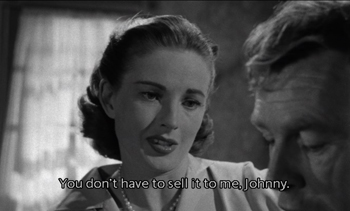 | 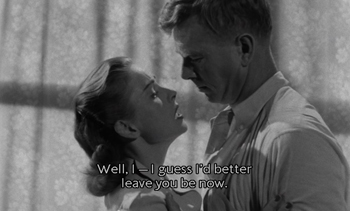 |
Shot 49 | Shot 49a |
 |  |
This scene is very similar to the one in the novel, a difference being that Fay, in the novel, isn't strongly illustrated with this level of lack of confidence and insecurity. In the film, we've the feeling that part of her reason for being with Johnny is due her lack of self esteem. She may love Johnny but he is also her only option. As she says, "I'm no good for anybody else. I'm not pretty and I'm not smart. So, please, don't leave me alone anymore." There is nothing like this in the novel. We can see for ourselves that she is attractive, so we know her view of herself is distorted, that what she is saying doesn't reflect reality. The reason for her insecurity is never disclosed, and though Johnny is tender with her he doesn't attempt to elevate her opinion of herself.
In the book we have the background of Fay being quite a bit younger than Johnny and her having been in love with him, a neighborhood guy, since she was young. As in the book, she is a minor character appearing only at the beginning and end, yet she has a wonderful strength of presence.
For their protection, in the book Marvin has an agreement with Johnny that he's not to go out or have in any visitors. Marvin feels it is best that Johnny keep as low a profile as possible and not be seen out and about the neighborhood. Johnny violates this agreement by both going out and having Fay in, but she doesn't run into Marvin in the book. He only surmises that Johnny has had a visitor when he finds a bobby pin in the bathroom. The film doesn't appear to have these restrictions, and Marvin and Fay are on friendly terms at this one meeting.
A consistent motif in this movie are bars that remind of prison, which we become especially cognizant of when Fay remarks on how she herself has felt to be in jail during Johnny's imprisonment. We have the bars of the ticket cages at the racetrack. The bars of the bed etc. These bars fit in with Nedda, in Pagliacci, reflecting on her sense of imprisonment by her husband when she watches birds flying free. But this is certainly not unique to The Killing, for we have the same bar motif in Lolita as well as the same allusions to the caged bird. I'll comment on this further toward the end when discussing the parrot.
The style of the photography in this section (which is beautiful) is where we begin to get into Lolita territory, Kubrick employing the same in the Haze household. Rather than giving a clear view of Johnny, the camera travels beyond the fourth wall, crossing the three partitions between each of the rooms through which he travels, and more than these slicing and segmenting our view for we also have the exotic cut-out obstructions of bookcases and other pieces of furniture intervening. In Lolita, Kubrick will eventually play with these dark slicings of scene as a way of compacting physical space and expanding time so they are more than simple obstructions.
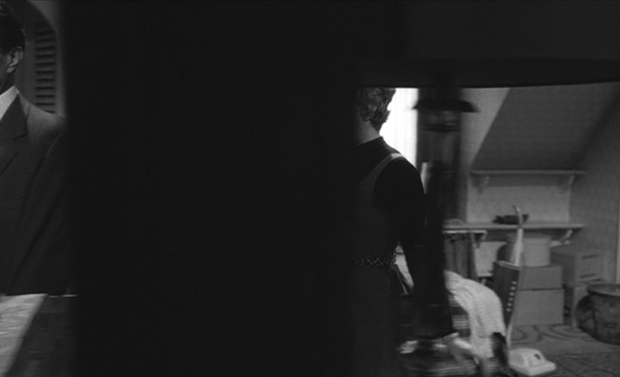
Time and space are played with as well here, but differently than in Lolita. Johnny's long walk through these four rooms (Marvin's apartment had only two rooms in the book), reminding of Marvin's long walk through the clubhouse in which the camera is just beyond the crowd, seems to expand Marvin's apartment physically due these impediments. As we're not able to see where he's going, not having a clear view of the rooms, it begins to feel as if Johnny could keep passing forever through one wall after another. This kind of tracking was very new for the time and is quintessential Kubrick. He insisted upon the shot being just this way. Knowing that the film has elements of Pagliacci, we can conjecture that Kubrick may have moved outside the fourth wall, taking us out of the rooms into the space of the audience, in keeping with the theatrical aspect of Pagliacci.
50 MLS as the bartender enters his home. (9:52)
NARRATOR: A half an hour earlier, at approximately 6:30, Mike O'Reilly, the track bartender, came home.
51 MLS An ill Ruthie asleep in bed. (9:56)
MIKE: Ruthie, I'm home.
He pats down her forehead with a kerchief, and the camera pans up to his face. It follows him to the window where he looks at some potted plants before it, wipes his face in concern then looks at the pamphlet given him by Unger.
52 CU the pamphlet. (10:31)
The writing is again slightly different than that in shot 13.

53 MS of O'Reilly, as ended shot 51. (10:36)
He puts the pamphlet back in his pocket.
Shot 50 | Shot 51 |
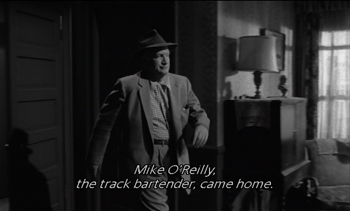 | 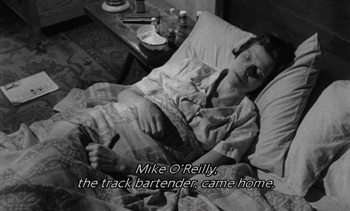 |
Shot 52 | Shot 53 |
 | 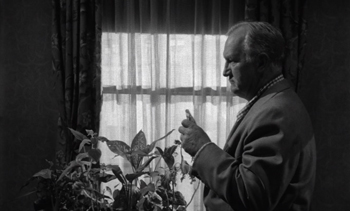 |
Mike is not too different in the film from the book in which he was an older, beefy man. Kubrick has given him an ill wife, whereas in the book Mike's wife seems to be healthy and he is instead concerned with getting into a better neighborhood as he fears his teenage daughter being too heavily influenced by the lower class setting and the kids and values around which she's grown up. His primary concern is providing a better future for his daughter.
Giving Mike an ill wife ups the sympathy factor. One also feels for the wife when Mike is killed, knowing she is bedridden and waiting for him. In fact, Mike, as far as we are aware, is the only character who leaves behind anyone who will fruitlessly wait his return.
Removing the teen daughter simplifies the story line and reduces dialogue necessary for communicating Mike's situation to the audience. All one needs to know about the couple is telegraphed by Mike's wife being bedridden, the bottles of medicine to the side of the bed, and his expression of devotion and anxiety for her.
Just as the note George receives from Marvin is not the same as we observed to be written by Marvin, we have the same here, Mike's review of the note he received from Marvin again being ever so slightly different from what we saw in shot 13.
Shot 13 | Shot 52 |
 |  |
54 MLS George arriving home. (9:52)
NARRATOR: At 7:15, that same night...
PEATTY (setting down his hat): Hello.
The camera tracks with him as it had Clay. From the entry hall, through the partition, to the living room/bedroom where Sherry rests.
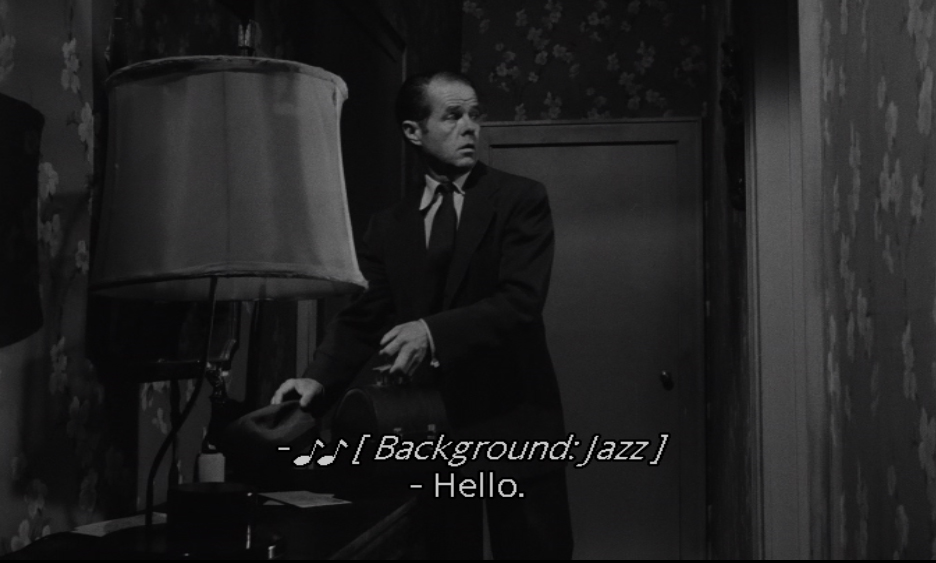
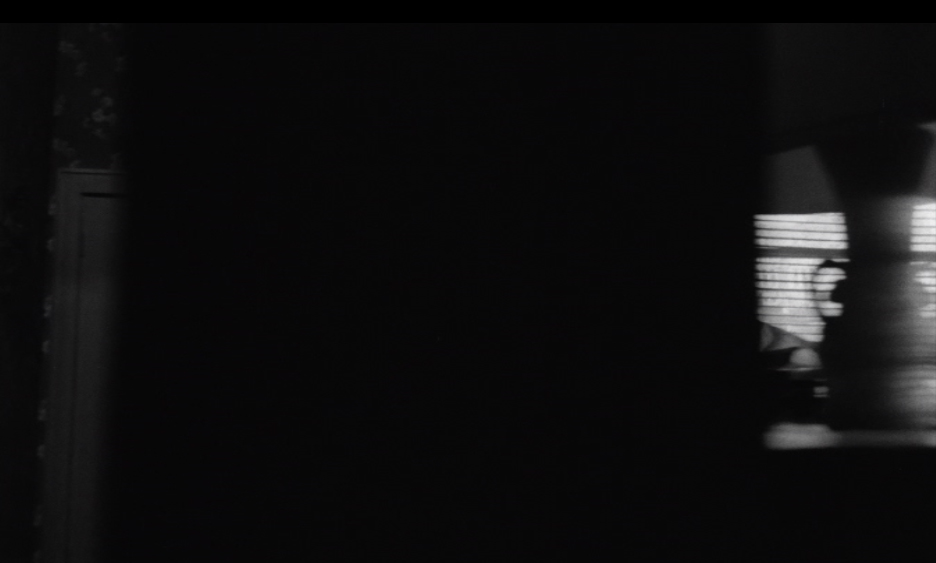

George bends to kiss her.
SHERRY: Hello.
GEORGE: Feeling okay?
SHERRY: Fine.
PEATTY (sitting on the bed): I been kinda sick today. I keep getting pains in my stomach.
SHERRY: Maybe you got a hole in it, George? Do you suppose you have?
GEORGE: A hole in it? How would I get a hole in my stomach?
SHERRY: How would you get one in your head? Go fix me a drink, George. I think I'm developing some pains myself.
GEORGE: Sherry, can't I ever say anything at all without you joking me about it?
SHERRY: Hurry up with that drink, George. The pains are getting worse.
PEATTY (going to the bar): I saw something kind of nice, coming home on the train tonight. Something, well, kinda sweet.
SHERRY: A candy bar, George?
PEATTY (pouring drinks): No, not a candy bar, doughnut. It was people. (Carries the drink back to her.) This couple, just in front of me. Oh, they weren't young, exactly. I guess the woman was about your age.
SHERRY: A little senile, you mean? With one foot and a big toe in the grave?
GEORGE: You want to hear this or not? Do you or not, Sherry?
SHERRY: I can't wait. Go ahead and thrill me, George.
GEORGE: Well, anyway, like I say, they were sitting just in front of me, and I could hear what they were saying. Well, part of it. They weren't young, exactly, and they weren't really old.
SHERRY: She was about my age, you said. Not anymore. Maybe she was when you started telling this story, but not now.
GEORGE: Anyway, she was calling him Papa, and he was calling her Mama.
SHERRY: And the climax to this exciting story? The moral? The punch line, George?
GEORGE: Forget it, Sherry. Just thought I'd tell you about it. But I might have known...
SHERRY: Oh, I know. You want to bet I know? I'll give you seven to five.
GEORGE: Cut it out, will you, Sherry?
55 MS Sherry as George stands. (12:23)
GEORGE: I'm tired. I don't feel so good.
SHERRY (rises and follows): You want me to call you, Papa, isn't that it, George? And you want to call me Mama.
PEATTY (before the parrot's cage): You know all the answers.
SHERRY: Go right ahead. Course, it may be the last word you ever say, but I'll try to kill you as painlessly as possible.
GEORGE: I gotta go out tonight. I don't suppose there's anything for dinner.
SHERRY (walking screen right with Peatty following): Of course there is, darling. There's all sorts of things. We have steak and asparagus and potatoes.
GEORGE: I don't smell nothing.
SHERRY: Well, that figures. 'Cause you're too far away from it.
GEORGE: Too far away from it?
SHERRY: Certainly. You don't think I had it all cooked, do you? It's all down in the shopping center.
GEORGE: Tell me something, would you, Sherry? Just tell me one thing. Why did you ever marry me anyway?
SHERRY: Oh, George, when a man has to ask his wife that, well, he just hadn't better, that's all.
56 Sherry settles on the bed, George sitting down beyond. (13:05)
SHERRY: Why talk about it? Maybe it all to the good in the long run. After all, if people didn't have headaches, what would happen to the aspirin industry?
GEORGE: You used to love me. You said you did, anyway.
SHERRY: I seem to recall you made a memorable statement, too. Something about hitting it rich and having an apartment on Park Avenue and a different car for every day of the week. Not that I really care about such things, understand, as long as I have a big, handsome, intelligent brute like you.
GEORGE: It would make a difference, wouldn't it? If I had money, I mean.
SHERRY: How would you define money, George? If you're thinking of giving me your collection of Roosevelt dimes...
GEORGE: I mean big money. Hundreds of thousands of dollars.
SHERRY: You really don't feel well, do you? You sure that pain's in your stomach?
GEORGE: I'm going to have it, Sherry. Hundreds of thousands. Maybe a half a million.
SHERRY: Of course you are, darling. Did you put the right address on the envelope when you sent it to the North Pole?
GEORGE: Go ahead and laugh. Wait and see. Maybe you won't be laughing so hard in a few days.
SHERRY: You're really serious. You really think you're going to have a lot of money.
GEORGE: I don't think nothing. I know it.
SHERRY: You've never been a liar, George. You don't have enough imagination to lie. So, what makes you think, or know, that you're going to have several hundred thousand dollars?
GEORGE: Because I do. I just can't talk about it. That's all.
SHERRY: Not even to me? Your little Sherry?
57 MCU George. (14:16)
GEORGE: I shouldn't have even mentioned I was going to have it. It's not that I mind. I know I can trust you. But if these other guys ever...
SHERRY (off screen): These other guys?
GEORGE: I can't talk about it, Sherry. I just can't.
58 MCU Sherry from beyond George's left. (14:25)
SHERRY: These other guys, is that why you're going out tonight, to meet with them?
GEORGE: They've got nothing to do with that. I just gotta go uptown for a little while.
59 LS Sherry and George (14:33)
SHERRY: I see. Well, you go right ahead, George. If you want to act that way, I certainly won't try to stop you.
She rises and moves toward the camera and her dressing table. She sits before it.
GEORGE: Sherry, no. Sherry, honey, don't be sore at me.
SHERRY (cuts on the lamp): Well, after all, when a woman's been married for five years, and her own husband doesn't trust her...well, you think more of them than you do of me.
GEORGE: What right have you got to say a thing like that? You know I'm crazy about you. I'd do anything in the world for you. Honey, you're the one I'm doing it for. If I didn't love you so much...
SHERRY: Look, I don't want you to do anything for me. I don't even want to talk to you anymore. You go out and see your fellow, whatever you want to do.
GEORGE: Sherry!
SHERRY: But don't you be surprised if I'm not here when you get home. Don't you at all be surprised.
GEORGE: You better be here, you hear me, Sherry? You will be, won't you? You wouldn't do anything foolish, would you?
SHERRY: I certainly wouldn't want to, but as long as you don't trust me or have the slightest bit of faith in me...
GEORGE: Sherry, if I ever found you with another man...
SHERRY: But why? You have no use for me. Oh, you say you do, but when it comes to a showdown or proving it, well, you say one thing then you do the opposite.
GEORGE: Well, I could tell you a little bit about it, I guess. Well, most of it. But you got to promise to keep quiet.
SHERRY: Why of course, darling.
Shot 54 | Shot 55 |
 |  |
Shot 56 | Shot 57 |
 |  |
Shot 58 | Shot 59 |
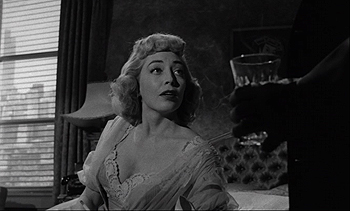 |  |
George and Sherry. I hated them when I first saw the film. Couldn't get into them. He was too grotesque-comical and she was too film noire and yet not, as if they both soared over the top into a near parody of film noire. Now, however, I think they're a pretty genius pairing, and had warmed up to them considerably before finally catching on to George being Pagliaccio/Pierrot and Sherry as his Columbine.
George, his stature overwhelmed by the formidable Sherry on screen (Elisha Cook Jr. was 5 foot 5, Marie Windsor was 5 foot 9, Sterling Hayden was 6 foot 5), his intellect confounded by her, is one horror show facial gyration after another of brain battling to wrap itself around his wife's unrelenting sarcasm, failing ever to match her right up to the end. But the book is not at all this way. In the novel, George is a miserable creature, even malign, seemingly devoted to Sherry and bewildered she would have him, but he also repulsively finds his manhood in overpowering her sexually. She plays at not wanting to submit to sex, says no, and he always ultimately forces himself on her, deriving satisfaction from feeling he has raped her, which bolsters his sense of masculinity. At least this is the dynamic given in the book. As for Sherry, in the novel she's a petite and exotic woman in her early twenties, still far distant from an age when her beauty and sex appeal will begin to fade, whereas in the film she is older and more experienced. In the book, as in the film, all who see George and Sherry together wonder what's the attraction as she is intelligent, beautiful, sexy, and faithless. Then they realize that George was a temporary money solution.
Sherry, in love with a hood named Val, is eager to find a way out of her marriage but in the novel she doesn't engage in the non-stop lobbing of pyrotechnic verbal arrows by which Sherry finds some release for her rage in the movie. Smarter than George, she is a witty, sardonic "clown" as Columbine. In the book, Sherry gives George grief about not having money and being left with nothing to do all day long, but there is nothing about the meal still being down at the shopping center as they're unable to afford it.
Johnny is the star of the film but George and Sherry are the engine that propels it forward. George is the weak link that will bring disaster on them all, Sherry his poison. We know this from the beginning, just as Achilles knows he's got a bad heel, and we wait to see how this particular Achilles' heel plays out, aware that it's the door to doom.
Kubrick, I read, wanted Marie Windsor for this part after seeing her in The Narrow Margin, which is a film with a very problematic plot, but has a wonderful train set, is beautifully shot and edited, and Marie in it is pretty phenomenal.
This conversation, which ends up absent a punch line, isn't in the book. There are numerous allusions to famliy and pregnancy and parenthood in the film. There is none of this conversation in the book about George's ride home on the train and seeing the couple calling each other Papa and Mama.
It is 7:15 pm, Saturday, and Sherry and George are talking about his having a pain in his stomach (maybe a hole, Sherry says) and a hole in his head. Sherry says she too begins to feel she has pains. This serves as foreshadowing that at 7:15 pm, the following Saturday, George is going to have a few holes in his head and Sherry is going to end up with one in her stomach.
In the book Val is described as wearing a Chinese silk robe. It seems to me that this may have given some direction as to the decoration for George and Sherry's apartment with the 1950s kitsch "orientalism" theme.
60 MS of a bed, buzzer sounding, a man's hands hurriedly straighten the bed a little before answering the buzzer. (15:41)
The man opens the door and Sherry enters.
VAL: Well...
SHERRY (entering) Hello.
VAL: How'd you get away from George tonight?
SHERRY: He had to go somewhere.
VAL: That's a break. I'm glad you called me.
He tries to embrace her from behind and she steps away.
VAL: Is something wrong, baby?
SHERRY: No, nothing's wrong.
VAL: Can I get you a drink?
SHERRY: No, I don't think so.
VAL: Come on, now. That's not my baby.
SHERRY: Val, I called you last night.
VAL: Oh yeah?
SHERRY: There was no answer.
VAL: I guess I stepped out.
SHERRY: I called you four times.
VAL: Honey, I guess I was out somewhere.
SHERRY: Oh? What'd you do?
VAL: I don't know. I guess I was goofing off at a movie or something.
SHERRY: Val, why are you doing this to me?
VAL: I don't know what you mean.
SHERRY: I think you do.
VAL: Oh, look, Mrs. Peatty. What I do is my own business. I never tried to pin you down, did I? I never asked how you got your kicks before you met me, did I?
SHERRY: That hurt, Val. You didn't used to talk to me like that.
VAL: I'm sorry, baby, but don't bug me. I gotta live my life a certain way. I can't stand it when the walls start closing in.
SHERRY: But you know how crazy I am about you.
VAL: And I'm crazy about you, too, sweetheart. I've given you sufficient proof of that.
SHERRY: Well, I know. It's just that lately every time I call...
VAL: So I step out once in a while. Look, you got yourself a husband, a guy who'll spend every last nickel on you, won't ask you any questions when you come home from an afternoon movie at 9:00 at night. Don't be greedy.
SHERRY: I'm not greedy, Val. I'm in love with you and if that's being greedy then I'm the biggest glutton that ever walked the earth.
VAL: Don't make it sound so ominous. It's not like you're gonna eat me alive.
SHERRY: I may just do that.
Fade to black.
61 MCU Sherry sitting beside Val. (17:20)
SHERRY: Darling, what are the two things in life you're most interested in?
VAL: What?
SHERRY: Money and women?
VAL: Oh, that's a nice way to put me down.
SHERRY: That about sums it up, doesn't it?
VAL: We'll let it stand. But I imagine what you really meant to say was "money and woman".
SHERRY: We're gonna have money, Val. More money than you ever dreamed of. Maybe even millions.
VAL: Oh, yeah? How?
SHERRY: George, that's how. He's stumbled onto something big.
VAL: That meatball?
SHERRY: A meatball with gravy, Val. You know he works at the track. Well, somehow, and don't ask me how, but he's got connected with a mob. They're gonna rob the track offices for the day's receipts.
VAL: You mean he seriously told you that he and some mob are gonna knock over the racetrack?
SHERRY: And you can believe him, Val, because George may be a fool but he's not a liar.
VAL: The guy's crazy. That's never been done before.
SHERRY: I know. I told him that, but he says the job's all set up and it's gonna be done. And if I'd just sit tight, I'd be up to my curls in cash, just like that.
VAL: Well, let's suppose this is all true, how do I fit in?
SHERRY: Well, you know I've been gonna leave George.
Sherry rises, briefly obscuring the lens. And Kubrick then cuts to shot 62.
62 MLS George on the sofa. (18:21)
SHERRY: I guess you know why, too.
VAL: Well, you've been saying that for a long, long time, Sherry.
He rises and goes to stand beside her at the mantle.
SHERRY: But everything's changed now. I was gonna tell him tonight. George may be very rich very soon.
VAL: That's all he needs, isn't it?
SHERRY: He'd still be George.
VAL: So you think, uh, let's say George and his boys pull this job, and George gets his cut, maybe I could take it away from him, huh?
SHERRY: I think you could.
VAL: What about the others? You got any idea who they are?
SHERRY: Only this. I went through his clothes while he was showering. (Hands Val the paper.) I'm quite sure George went there tonight.
VAL: Hmm. Kiddo, I think we got something here. You know, if this is true, this is a lot bigger than you think. You interested in taking Georgie's cut? Well, I got news for you. Georgie's cut's gonna be peanuts compared to this whole thing. We gotta find out more about the overall plan. You think he'd tell you any more?
SHERRY: Not a chance. I could see he was scared stiff because he talked as much as he did.
Shot 60 | Shot 61 |
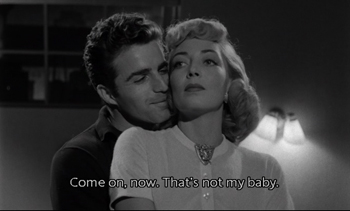 |  |
Shot 62 | Shot 62a |
 | 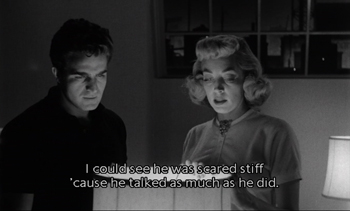 |
If George is Pagliaccio and Sherry is Columbine, Val is a version of Silvio. Kubrick has made him handsome and young, whereas in the book Sherry is perplexed at her attraction to him due to his ugliness, and yet it is because of his being ugly she is drawn to him.
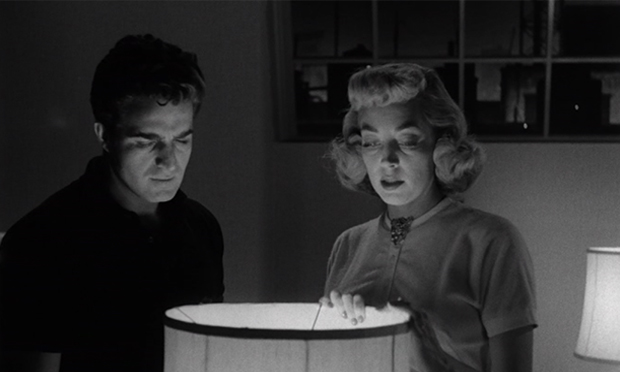
I guess you could caption this shot "the campfire". This scene in some respects is highly artificial compared to the naturalism of the others. The landscape out the window isn't concealed with curtains or blinds, and seems to eschew realism for stage theatrical. Lamps, I guess, are supplying natural light. Perhaps this is a reason to hover around the lampshade. And the actors may just be struggling to make why they're standing around a lamp somehow work nonchalantly into the scene rather than just being a light source. I don't know. On the other hand, I've wondered if this focus on their focus on the lamp light may be connected to Maurice's little story on the Siberian goat-herder who stared at the sun trying to understand its nature and went blind. One way I think we can tell that this focus on the light is intentional is that the very next shot (63) focuses on the flame of Johnny's cigarette lighter as he lights Mike's cigarette. The focus on this lamp light transfers over to the focus on the flame of the cigarette lighter.

63 CU of Johnny taking a lighter out of his pocket to light Mike's cigarette. (19:19)
MIKE: I don't get it Johnny, about these two other guys. You mean there's gonna be two other guys in on the deal, and we ain't gonna know who they are?
64 MS Johnny across the table, viewed between Mike and Marvin. (19:30
JOHNNY: That's right. You don't know who they are and they don't know who you are. That makes sense to you, doesn't it?
65 MS Mike, Randy and George. (19:35)
MIKE: Yes, I guess so, but, I...
RANDY: It makes sense to me, all right. How come we need 'em, though, Johnny? What are they gonna do?
66 MLS from above of the men at the table. (19:41)
JOHNNY: Well, one of them's for the job with the rifle. None of you boys can handle that, even if you were willing to. And the other one starts the fight in the bar.
GEORGE: These other fellas, how much are they cutting in for? Not that I mind. Any thing you do is okay, but...
JOHNNY: These men are not gonna be in on the basic scheme.
67 MS Johnny across the table, viewed between Mike and Marvin. (19:54)
JOHNNY: They're getting paid to perform certain definite duties at a certain definite time, and they're not cutting in on the take. They'll be paid a flat price to do a straight job.
68 Randy and George. (20:02)
RANDY: Well, if they don't know anything about the basic plan, about the job, they why are they doing it?
JOHNNY: It's simple. These boys are straight hoods. They get paid in advance. 5 grand for the one with the rifle, 2500 for the other.
GEORGE: Where's this money coming from?
JOHNNY: That's where Marvin comes in.
69 MCU Marvin. (20:14)
JOHNNY (off screen): He's getting the 7500 for us, and he gets it back off the top.
MARVIN: I wish I could do more, Johnny. It's almost not right for me to get as much sa everybody else. After all, all I do is...
JOHNNY: Your money counts for...
70 MS Johnny across the table, viewed between Mike and Marvin. (19:54)
JOHNNY: ...plenty, Marv. You don't hear any of them complaining, do you?
MIKE: Sure, you're okay in our book, Marv...
71 MS Mike, Randy and George. (20:30)
MIKE: ...but look, Johnny, if these two hoods get paid in advance, how do you know they're gonna do their jobs?
JOHNNY (off screen): I'll vouch for them. These guys are pros. They can't afford to weasel out on a deal. If they did, they'd be washed up. Okay?
MIKE: Okay.
JOHNNY (off screen): Any other questions? Well, let's take a look at this then.
72 MLS from above of the men at the table. (20:49)
JOHNNY: This is a rough drawing of the track as I remember it. Randy, you'll have to get me an A-1 street map of the whole district. George, Mike, I want you to go over this thing with me inch by inch. Bring it completely up to date, add or subtract the slightest change, even if it's something as small as the placement of a hot dog stand.
73 MS Johnny across the table, viewed between Mike and Marvin. (19:54)
JOHNNY: Now, give or take a few thousand, I figure the loot on this deal at 2 million. There should be that much in the track offices. That includes profits on the parimutuel betting, the breakage money, taxes from the mutuel machines, receipts from the concessions and the money from ticket sales. None of this money is allowed to accumulate at any one point around the track. Except for money to make change with and the mutuel clerk's payoff money, why, it all goes into the office. And, out of the entire take, only a few thousand dollars is put in the office safe to cover emergencies. The rest is out in the open, held for pickup by armored car.
74 MS Mike, Randy and George. (21:42)
JOHNNY (off screen): That car arrives about 5:00 and parks directly in front of the main entrance to the clubhouse.
75 MS Johnny across the table, viewed between Mike and Marvin. (21:47)
JOHNNY: 2 men stay in it. One at the wheel and the other at the machine gun in the turret. 2 others enter the office to collect the dough. Now, they're armed, of course, and so are the track detectives who cover them from the car to the office and back.
76 MS Mike, Randy and George from beyond Johnny's right shoulder. (21:57)
JOHNNY:
Now, once the armored car arrives, a, uh, stickup is...
Thumping.
JOHNNY: ...out of the question.
They all look back at the door. Johnny and Mike rise and step out of the shot. Marvin moves between Mike and George.
Shot 63 | Shot 64 |
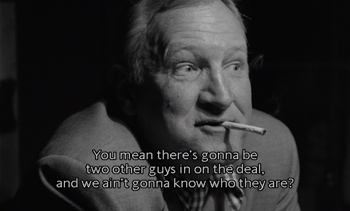 |  |
Shot 65 | Shot 66 |
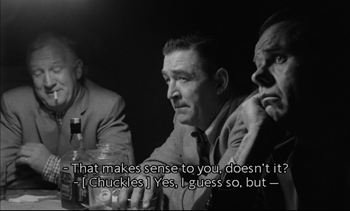 |  |
Shot 67 | Shot 68 |
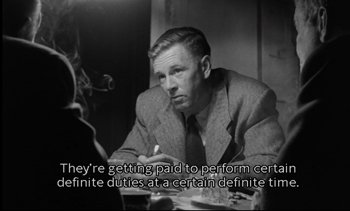 |  |
Shot 69 | Shot 70 |
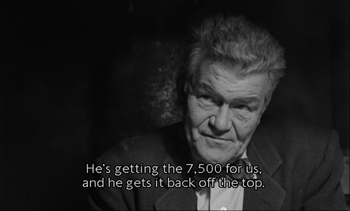 | 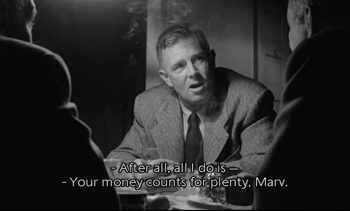 |
Shot 71 | Shot 72 |
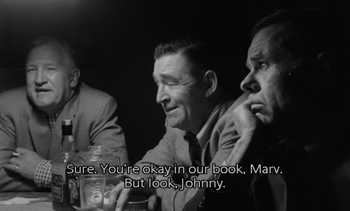 | 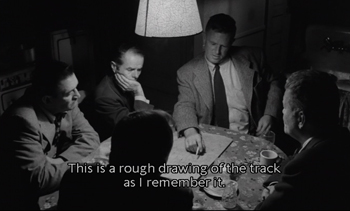 |
Shot 73 | Shot 74 |
 | 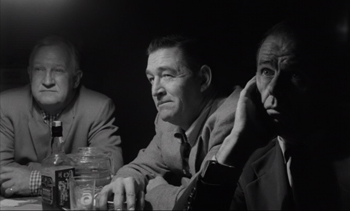 |
Shot 75 | Shot 76 |
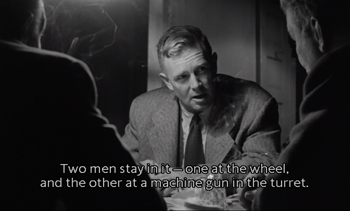 | 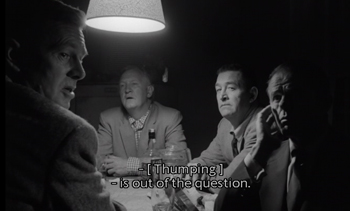 |
77 MLS of Mike, Marvin and George at the table. (22:10)
They rise as well and begin to move toward the sound, camera tracking them behind a wall partition...
We realize they are in Marvin's kitchen as they leave it and enter the first middle room. In the middle room, they hear a door open, and a blow. They pass into the second middle room, the camera tracking from beyond the 4th wall.
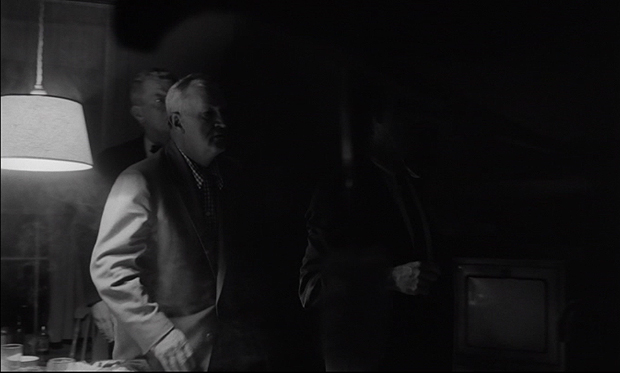
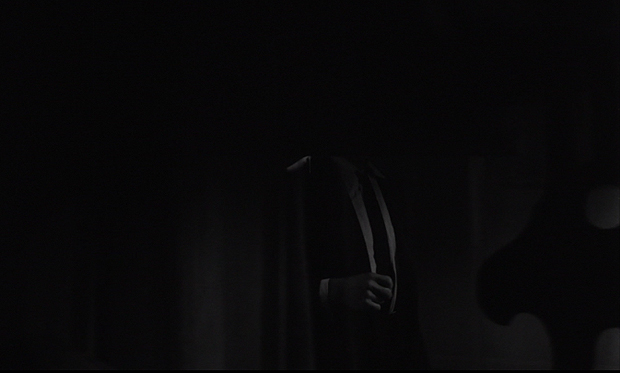

Sound of the door opening. A woman gasps. We hear a slap and someone falling to the floor.


RANDY (off screen): Say, now, what in the name of Pete would a babe be doing outside that door?

George, Marvin and Mike then pass into the front room.
JOHNNY (placing Sherry on the bed): Uh, what do you think? You guys, any of you seen this woman before?
78 MCU Sherry.
GEORGE: It's Sherry, my wife.
79 MCU George (grabbed by Randy). (22:40)
RANDY: Why, you...you been talkin. Now you spilled to her.
GEORGE: No, I did not. What, do you think I'm crazy? I wouldn't.
RANDY: You jerk! You clown!
He slaps George.
RANDY: Come on, clown. Sing us a chorus from Pagliacci!
JOHNNY: You better talk, George. Come clean. Either you talk or we'll get it out of her.
80 MLS The men through the headboard bars of the bed. (22:53)
GEORGE: Please, you wouldn't do anything to her, Johnny. Please!
JOHNNY: I don't wanna, but if you won't talk, if you won't tell us what you told her...
GEORGE: I didn't tell her nothing! Honest, I didn't. Why would I do a thing like that, Johnny?
RANDY: Sure, she wouldn't. She's just a building inspector, isn't she? She just stopped outside that door to measure the keyhole. Why, you...
JOHNNY (interrupts before Randy hits George again): Let's have it George.
81 MCU George and Johnny. (23:09)
JOHNNY: We're gonna get it out of one of you. If you didn't tell her anything, then why was she around here snooping?
GEORGE: Oh, she must have found the address in my pocket. Sure, that's what it was. Thought I was two-timing her, you know, running around with another, well, of course, she's just checking up on me, John.
82 CU Johnny from beyond George's right shoulder. (23:25)
83 MCU George and Johnny. (23:27)
GEORGE: I didn't tell her nothing. Honest, I didn't. You'll let her go, won't you? You won't hurt her, John?
JOHNNY: Randy? Mike? Take him home to his apartment and stick with him until I phone you.
84 MLS The men through the bars of the headboard. (23:29)
GEORGE: No, I'm not leaving Sherry.
RANDY: You're leaving, all right. Now, how are you going? Sliding or walking?
MIKE: Come on, George, let's go.
Johnny opens the door and they leave with Mike holding George by one arm and Randy the other.
Shot 77 | Shot 78 |
 |  |
Shot 79 | Shot 80 |
 |  |
Shot 81 | Shot 82 |
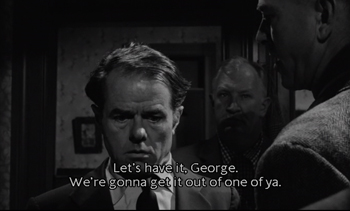 | 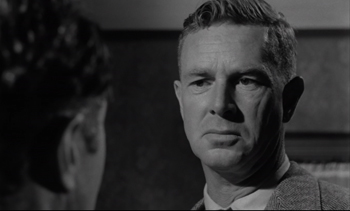 |
Shot 83 | Shot 84 |
 |  |
85 CU of Sherry. (23:51)
MARVIN (off screen): What are you gonna do now, Johnny?
Sherry's eyelashes flutter, signaling she's not unconscious.
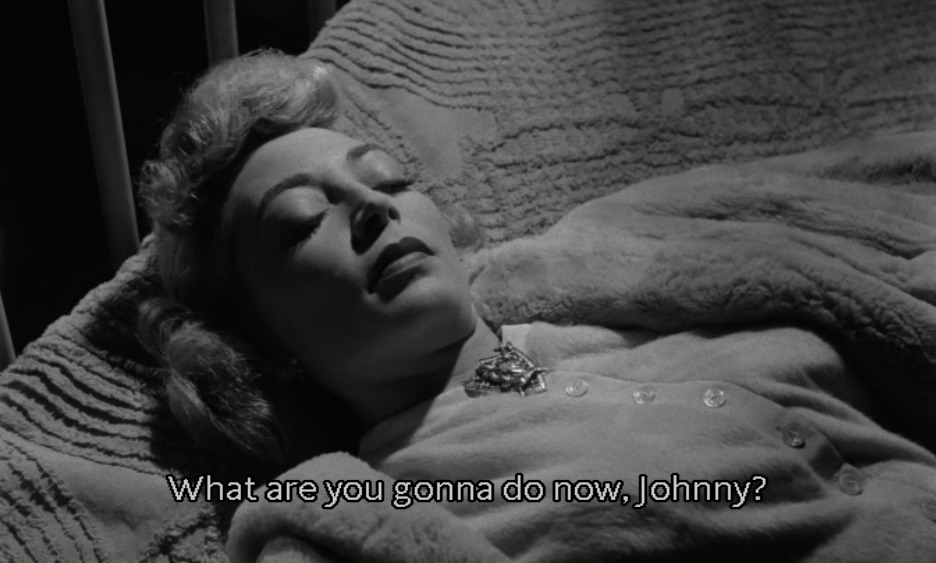
86 MCU Johnny. (23:56)
JOHNNY (winking to Marvin): Oh, I don't think I'll have to kill her. Just slap that pretty face into hamburger meat, that's all.
87 MS Marvin and Johnny through the bars of the headboard. (24:02)
JOHNNY: Marv, why don't you take yourself a walk for an hour or so.
MARVIN: Yeah, yeah. I'll be back in a couple of hours. (Exiting.)
88 LS Mike and Randy leading George out of 504 building. (24:10)
They climb into a convertible with him and drive off. The camera swings back to show Marvin exiting. He lights a cigarette and walks up the street past Val and Tiny seated in a car, Val lighting a cigarette.
89 MS of Johnny seated on the bed beside Sherry. (24:48)
JOHNNY: All right, sister, that's a mighty pretty head you've got on your shoulders. You wanna keep it there, or do you wanna start carrying it around in your hands?
90 MCU Sherry from beyond Johnny's left. (24:55)
SHERRY: Maybe we could compromise and put it on your shoulder. I think that'd be nice, don't you?
JOHNNY: What were you doing outside that door?
91 MCU Johnny from beyond Sherry's right. (24:59)
JOHNNY: What were you doing outside that door?
SHERRY: Doing? I was listening, naturally. Trying to, I should say.
JOHNNY: Oh, you admit it. You admit you were out there snooping.
92 MCU Sherry from beyond Johnny's left. (25:07)
SHERRY: Yes, wasn't that naughty of me? But I'm afraid I was. I found an address in George's pocket. I thought he might be playing around with another woman, so I came over...
JOHNNY: And you'd care if he was playing another dame?
93 MCU Johnny from beyond Sherry's right. (24:59)
JOHNNY (laughs): That would bother you?
94 MCU Sherry from beyond Johnny's left. (25:20)
SHERRY: You don't understand me, Johnny. You don't know me very well.
JOHNNY: I know you like a book. You're a no good, nosy little tramp. You'd sell out your own mother for a piece of fudge, but you're smart along with it. Smart enough to know when to sell and when to sit tight, and you know you better sit tight in this case.
SHERRY: I do.
Shot 85 | Shot 86 |
 |  |
Shot 87 | Shot 88 |
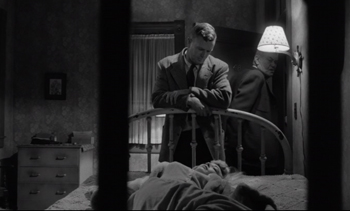 | 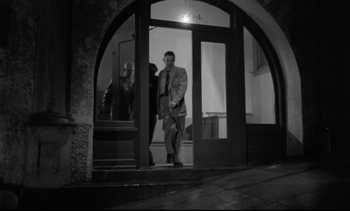 |
Shot 89 | Shot 90 |
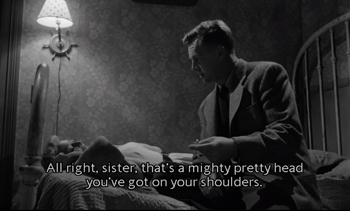 |  |
Shot 91 | Shot 92 |
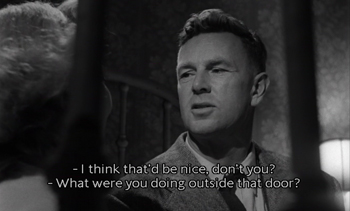 | 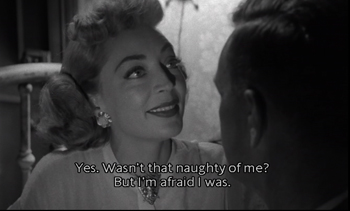 |
Shot 93 | Shot 94 |
 | 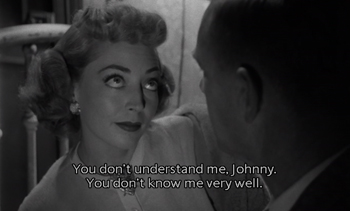 |
Shot 95 | |
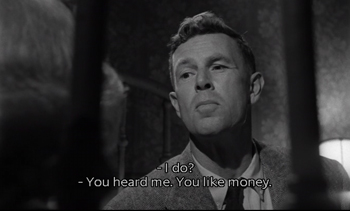 | |
95 MCU Johnny from beyond Sherry's right. (25:36)
JOHNNY: You heard me. You like money. You got a great big dollar sign there where most women have a heart. So play it smart. Stay in character, and you'll have money. Plenty of it. George'll have it and he'll blow it on you. Probably buy himself a 5 cent cigar.
SHERRY: Mmm, you don't know me very well, Johnny. I wouldn't think of letting George throw his money away on cigars. Isn't there a big "if" in there somewhere?
JOHNNY: Yeah, there's a couple of 'em. If you're smart, if you keep your trap shut and don't nose around any more, you'll have money. You'll be loaded with a capital "L". But, if you don't, there'll be nothing. We'll forget the whole thing. Nothing will happen and you won't have a penny.
SHERRY: I wouldn't like that. And, frail as I am, I'd much prefer to be loaded.
JOHNNY: I think we understand each other.
She leans forward to kiss him but he interrupts.
JOHNNY: Now, beat it.
Again, Kubrick trying to use natural light, at least to some extent, and getting some lovely results.
The background all enveloped in shadow, exempting the wall behind Johnny, this scene reminds of the boxing match in Killer's Kiss, in which there is no audience but the one in the theater seats. That spell is broken, however, by the eavesdropper. They have an audience after all.
Shot 77 duplicates 45, carrying us furtively from room to room as the men creep forward, alarmed. In shot 45 Johnny had proceeded through the rooms as the camera followed from beyond the 4th wall and he had been speaking about how the main men in on the job weren't criminals but all had a little larceny in their hearts. Here, Randy and Johnny have separated themselves from the group to confront what it is they've heard, while these non-criminals with a little larceny in their hearts hang back in the kitchen, frightened, then slowly creep forward to find out what is going on.
These scenes of movement from the rear of Marvin's apartment to the front room are really beautifully done. The first time, with Johnny walking through the apartment toward Fay (shot 45), it's all bravado and big talk confidence. This time (shot 77) we have the trepidation of Mike, George and Marvin. In shot 329, after the heist, we have a short version of this, with Marvin, Mike and Randy rushing to the door from the room next the front room when they hear the elevator, but they are eager, nearly unable to withhold their excitement, believing it's Johnny with the money.
In the novel, Sherry takes care of Johnny's threats by kneeing him in the groin. She attempts to seduce Johnny and they do indeed kiss and arrange to even meet later. She's impressed enough by him that she's surprised to find that in her imagination Johnny and Val have blended together.
Randy identifies George as Pagliaccio, the clown. This is not in the book. I've already written a little of Pagliaccio's relevance to the film in the previous segments and will discuss it again later.
Set decoration for Marvin's bedroom borrowed from the rooming house bedrooms of Davey and Gloria.
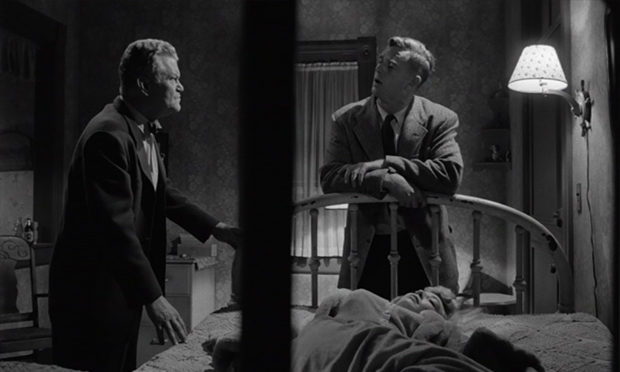
| 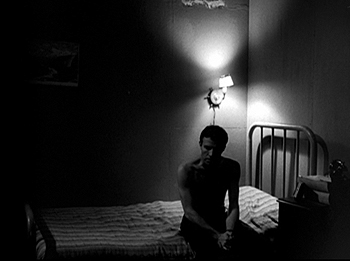 |
Davey had the curio shelf holding a miniature totem pole and Madonna statuette. Both Gloria and Davey had the ship wheel wall lamps and the metal barred beds.
96 MLS of George in his apartment, readying for bed, the camera tracking with him as he walks. (26:17)
GEORGE: Those guys. Fine friends they turned out to be, slapping me around, calling me dirty names. I thought that rotten Randy would cave the side of my head in.
SHERRY: Poor George. You're all right now, aren't you, darling? (She removes her eyelashes.)
GEORGE: Doggone it, Sherry. You shouldn't have come over there tonight it's a wonder we both didn't get killed.
SHERRY: I don't think there was much danger of that. After all, if they'd killed you, there couldn't be a robbery. (Putting on cold cream.) If they'd done anything to harm me or seriously offend you, why...
GEORGE: They have offended me. They've offended me plenty.
SHERRY: Oh, George, don't be such an old bear.
SHERRY: Well, what else could they have done? I thought they acted quite reasonably.
GEORGE: Well, anyway--what, what did Johnny do to you?
SHERRY: Do? I already told you. Just asked me some questions and made sure it was all right for me to leave.
GEORGE: Sherry, did, did Johnny try anything?
SHERRY: Why, George, what a terrible thing for you to ask.
GEORGE: I was pretty sure that you wouldn't...
SHERRY: I don't think you'd better say anymore.
GEORGE: Why did you come over there tonight, Sherry? It wasn't for the reason you said.
SHERRY: It was for the reason you said, George. You said it yourself.
GEORGE: I was just trying to make an alibi for you. I was afraid those guys'd kill you. You know that I wouldn't look at another woman. There wouldn't be any women chasing after a guy like me.
SHERRY: Oh, let's drop it, George. You put words in my mouth and then you say they're not true. I told you exactly what happened. Oh, dear. Everything's all right with you and your pals now. You're gonna have lots and lots of money and...
GEORGE: I've been thinking it over, Sherry.
SHERRY: I can hardly wait. How soon will it be, George? What day?
GEORGE: It ain't going to be, Sherry. I'm dropping out.
SHERRY: You're dropping...oh, you don't mean it, you can't mean it.
GEORGE: I'm afraid, Sherry. This business tonight, it kind of opened my eyes. It made me realize the kind of guys I was getting mixed up with. Before, all I thought of was the money.
SHERRY: Well, you just keep on thinking about that, George, and think how disappointed I'd be if you didn't get that money. I'm afraid I'd feel like you didn't really love me. I don't see how I could feel any other way.
GEORGE: Why? Why should I have to do a thing like that to prove to you that I love you.
SHERRY: George, what are you gonna do? I want to know right now. All you've ever done is talk about loving me. That's all I've had for the last five years is talk. Now that you have a chance to do something and to--all those things you promised--buy me things, well, what are you gonna do, George?
GEORGE: You know there ain't a thing in the world...
George and Sherry walk off camera right screen.
97 MLS of George and Sherry, from area of bed. (28:38)
GEORGE: ...I wouldn't do for you.
SHERRY: Then you'll do this for me, won't you?
GEORGE: I guess so.
SHERRY: It'll be perfect, George. You have no idea how perfect. I won't have long to wait, will I? It will be within the next few days, won't it? When will it be, George?
GEORGE: You got your own way, Sherry. You wanted me to go ahead with the deal, so I'm going. Now, leave me alone, will you?
SHERRY: I'm sorry, darling. Of course. We won't even talk about it if you don't want to.
GEORGE: You really love me, Sherry?
SHERRY: Of course.
GEORGE: You'll always love me?
SHERRY: Always and always.
Shot 96 | Shot 97 |
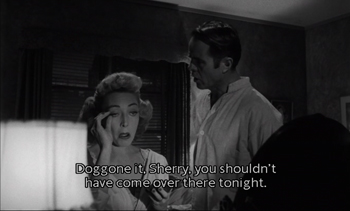 |  |
"Always and always". In Eyes Wide Shut, when Bill says they are now awake "forever", Alice demurs, asking not to use the word, that it frightens her. In The Shining the twins invite Danny to play with them forever and ever and ever, and Jack tells him he would like to live at the Overlook forever and ever and ever. Always and forever isn't cuddly and reassuring with Kubrick.
In Pagliacci it is Columbine's stage avowal of loving Harlequin "always" that sends Pagliaccio over the edge, as he had heard her profess the same to her lover in real life.
I don't know the source but I've read that the studio, in order to make the timeline clear for the audience, insisted that the narrative be added. True? Not true? I don't know. What happens if we remove it for this day? Absolutely nothing. Do we need the intro narration? Maybe. But we don't need the rest for the audience to have a good flow. The audience will assume that this day has a natural linear timeflow rather than one that jumps around and this assumption doesn't injure the story. After the track, Randy meets Leo. Johnny meets with Fay and Marvin comes home. Mike arrives home. George arrives home. Sherry meets with Val. The men meet at 8 p.m. and Sherry is caught listening at the door. Sherry and George are then at home. Without the narration, the audience will assume that time is linear in its portrayal and if it isn't it doesn't matter.
August 2014 transferred to html. Approx 14,600 words or 30 single-spaced pages. A 112 minute read at 130 wpm.
Go to Part 2
Go to Table of Contents of the analysis
Link to the main TOC page for all the analyses